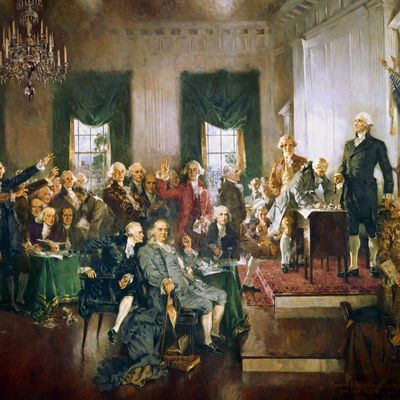
A longstanding conceit of conservative thought, which has returned with new force during the Obama years, is that conservatism is the authentic heir to the vision of the Founders. (See, for example, Paul Ryan’s recent op-ed, which offhandedly describes his own polices, in contrast with President Obama’s, as consistent with “the Founders’ vision.”) One can see this in a dispute between liberal writer Jonathan Cohn, who complains that the Senate gives disproportionate power to rural, conservative voters, and conservative Philip Klein, who rebukes Cohn by instructing him that the Founders Wanted It This Way:
In Federalist No. 62, Madison addressed the structure of the Senate specifically, writing that “the equal vote allowed to each State is at once a constitutional recognition of the portion of sovereignty remaining in the individual States, and an instrument for preserving that residuary sovereignty. So far the equality ought to be no less acceptable to the large than to the small States; since they are not less solicitous to guard, by every possible expedient, against an improper consolidation of the States into one simple republic.”
He went on to explain, “Another advantage accruing from this ingredient in the constitution of the Senate is, the additional impediment it must prove against improper acts of legislation.”
In other words, the Founders made it intentionally difficult to pass major legislation at the national level that would trample over the desires of smaller states.
It is true that the Founders agreed to create a Senate that gave every state equal voting rights regardless of population. It is not true that Madison — or Alexander Hamilton, whom Klein also quotes — wanted it this way. Madison, Hamilton, and most of the figures we regard as the Founders despised the idea of one state, one vote. They put it in the Constitution for the same reason they put in the three-fifths clause — because they were politicians, and they had to accept a noxious compromise or the whole deal would have fallen apart.
As Robert Dahl explains (excerpt via a review by Hendrik Hertzberg, who has nurtured a fantastic obsession with this issue), they argued fervently against one state, one vote during the actual negotiations:
Madison had been the Constitutional Convention’s most passionate advocate of giving the big states more senators than the small ones. Hamilton had been almost as adamant. “As states are a collection of individual men,” he harangued his fellow-delegates, “which ought we to respect most, the rights of the people composing them, or of the artificial beings resulting from the composition? Nothing could be more preposterous or absurd than to sacrifice the former to the latter. It has been said that if the smaller states renounce their equality, they renounce at the same time their liberty. The truth is it is a contest for power, not for liberty. Will the men composing the small states be less free than those composing the larger?”
Figures like Madison and Hamilton negotiated the best deal they could make, then they set out to sell it to the public, correctly calculating that a compromised Constitution was better than none. The Federalist Papers were an exercise in spin — spin in service of a worthy cause, but spin nonetheless.

There is, of course, a more broadly applicable lesson here. At any given moment in time, it always appears to be the case that our politicians are unprincipled sleazeballs, in sad contrast to their upstanding, principled forebears. But statesman are merely dead politicians. The Emancipation Proclamation only liberated slaves held in rebel territory, while leaving in bondage those in neutral states. Lincoln wrote a newspaper op-ed declaring, “If I could save the Union without freeing any slave I would do it, and if I could save it by freeing all the slaves I would do it; and if I could save it by freeing some and leaving others alone I would also do that.” This, too, was spin — Lincoln needed to hold the support of a crucial bloc of northerners who were willing to fight for Union but not for abolition. He settled for partial emancipation because that was the extent of his power at the time. When the opportunity came to abolish slavery everywhere, Lincoln seized it.
Madison’s compromise has held in part because his defense of the compromise has been erroneously translated through pop history as genuine conviction, and in part because advocates of proportional representation lack the votes to reform the Senate, just as they did in the 18th century. But we should be clear that the critics of the malapportioned Senate, not its defenders, are Madison’s true ideological heirs. Madison and his allies were practical politicians. This is another characteristic separating them from the tea party.
Update: Klein replies:
it’s the U.S. Constitution that represents the ultimate collective byproduct of the the Founders’ work, and the end result is what’s relevant in discussions about their vision. The parts of the Federalist Papers that I quoted in my column represented attempts by Madison and Hamilton to reassure states that if they agreed to join the union, their interests would be protected under the Constitution’s actual design. Whatever system Madison or Hamilton would have preferred if they got their way on everything is less relevant.
There are three points to make here.
1. Klein is now making a somewhat different argument than his original version, which presented one-state, one-vote as the inspired vision of Madison and Hamilton. That was the aspect of Klein’s column that was the central source of my objection. To be fair to Klein, he was repeating a common fallacy – assuming the byproduct of the Constitutional Convention (and the ensuing apologetics of the Federalist Papers) represented a kind of divine vision, and using the prestige of the Founders to present critics of the Constitutional structure as out of step with Madison, when in fact they share Madison’s beliefs.
2. It is true that, in order to reassure small states, the Founders agreed to give them an upper chamber that would give their citizens disproportionate representation. But everything that can be said about this compromise can likewise be said about the three-fifths compromise. Slave states demanded disportionate representation as a condition of ratifying the Constitution just as small states did. Madison and the people we think of as the Founders didn’t like that compromise any more than they liked the Senate compromise. Being pragmatic politicians, they defended it in the Federalist papers.
It may be practically impossible for small-d democrats to reform the Senate today, just as it was practically impossible to alter the three-fifths compromise. But Klein isn’t just making a practical argument – he’s making a moral one, too. He’s suggesting that a bargain, once agreed to, holds moral force for future generations, apparently for perpetuity. If we were holding this discussion before 1865 (or if slavery had not been abolished) would the three-fifths compromise still have moral force? Or – as I would maintain – should future generations regard it as a politically necessary concession to existing power arrangements they have every right to revise?
3. Even if we do regard the original compromise between small and large states as fair, it’s significant that, since 1789, the terms of the deal have shifted massively in favor of the small states. When the Constitution was ratified, the largest state had 12 times the population of the smallest. Today, as Hertzberg points out, the largest state has 68 times the population of the smallest.
Founders like Madison and Hamilton were willing, in violation of their values, to accept a 12-1 discrepancy in political representation in order to win acceptance of a Constitution. Would they have accepted a 68-1 discrepancy? We don’t know. In any case, the deal we have now looks quite different than the one Madison and Hamilton struck. In most ways, the United States has grown more democratic since its inception. In the disproportionate power to residents of the smallest states, it has grown less so.






























